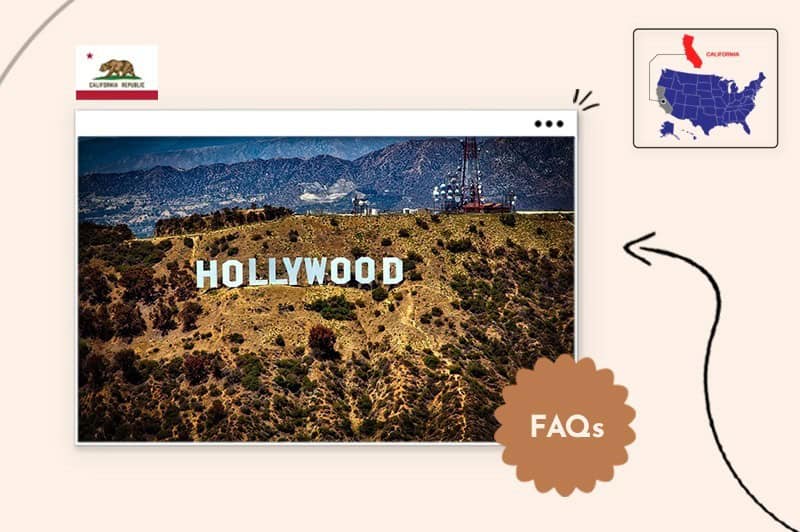
Start a Small Business → Start a Business in California → How Much is a Business License in California?
Making your business legal is one of the most essential steps to starting a business in the Sunshine State.
Another one is calculating your start-up expenditures, which includes the cost of a business license in California.
As California has no state business license, the answer depends on your niche and location.
We’ll look at both in this post.
But to save you time, let’s begin by answering the questions: what is a business license, and when do you need one?

The term ” business license” refers to any licenses, certifications, or permits you’ll need to sell a product, provide a service, and run your start-up in your location.
An operating license is the most common type of business license most start-ups need (all California cities and counties require one), as it includes your business tax certificate, enabling your state to track your tax liabilities.
Which business licenses you need and how you get them depends on the services or products you sell and your California location.
Let’s look at those next:
As you now know, California doesn’t have a general state business license; however, most counties and cities require entrepreneurs to get a small business license for tax purposes.
Entrepreneurs operating in other California counties or cities may also need a local business tax certificate for each location and their hometown business license.
One license, however, applies to most businesses operating in California.
The Sunshine State requires any business selling specific goods, services, and properties (in cases of real estate agents or property flippers) to have a seller’s permit (California Sales Tax Certificate Number).
Your seller’s permit enables you to collect and remit sales tax to the CDR (California Department of Revenue) and an additional local sales tax in most counties or cities.
You apply online with the Department of Tax and Fee Administration (CDTFA) for your California seller’s permit.
Seller’s permits are free; however, the CDTFA sometimes requires a security deposit to cover any outstanding taxes should your business close.
General business license fees (i.e., an operating license) vary throughout California counties and cities; however, most locations charge between $50 and $100. But that can rise to several hundred, depending on your chosen industry.
Two other things you should know about California business license fees are:
Depending on your location (and business size), your local Department of Revenue might levy a flat fee, instead charging you relative to your number of employees and a percentage of your annual income.
Some California counties/cities charge an annual business license renewal fee; others charge it every 2 or 3 years. Check with your local Department of Revenue office to see how often you must pay.
The good news is that some counties/cities exempt small businesses, removing the financial burden from your start-up costs.

Like all US states, California requires businesses to have specific licenses/permits; these include industries requiring extensive training, serving food and beverages, exposing clients to potential hazards, and using a formal entity like a limited liability company.
Professionals providing specific services to California residents need an occupational license to ensure service quality and to protect the public from harm. Industries that require an occupational license include.
You verify your occupation licensing fees and requirements by contacting the appropriate licensing agency, which you can find on the California Employment Development Department (EDD) website.
Entrepreneurs starting an LLC in California sometimes need a Certificate of Status (also called a Certificate of Good Standing) to prove to other organizations they comply with tax laws and requirements.
To get a Certificate of Status, submit a Business Entities Records Order Form to the California Secretary of State and pay the $5 fee.
You can find the regulatory agency and costs relative to your business by visiting the California Department of Tax and Fee Administration. And business licensing requirements and agency links on the CalGold website.

The cost of a business license in California varies depending on location, so contact your local county clerk’s office for further information. However, most small businesses pay between $50 and $100 for their general business license.
Each California county and city has unique business license filing requirements, but most ask for the following information.
To get your local business license, visit your municipality business license and permit office, complete all relevant forms, and pay the relevant fee.
California has no state business license, so it depends on your county or city. Still, a general occupation license usually takes less than 45 days.
Registering a DBA varies depending on your location, with fees ranging from $25 to $50, which you pay to your local county clerk’s office.
Entrepreneurs starting a Californian LLC register their name when forming their business with the California Secretary of State’s office; the fee is $70.
Business license exemption varies throughout California, so contact your county or city Department of Revenue office to see if yours needs a license.
Common exemptions, however, include nonprofit organizations, banks, insurance companies, café musicians, and small residential and child home care facilities.
The takeaway is that the cost of a general business license in California depends on your location.
Afterward, any extra licenses and permits you might need (like a seller’s license or health permit) depend on your chosen industry.
Once you have your niche and location, your next step is to learn how to start a business in California and begin living your SunShine State entrepreneurial dream.
This portion of our website is for informational or educational purposes only. Tailor Brands is not a law firm, and the information on this website does not constitute legal advice. All statements, opinions, recommendations, and conclusions are solely the expression of the author and provided on an as-is basis. Accordingly, Tailor Brands is not responsible for the information and/or its accuracy or completeness. It also does not indicate any affiliation between Tailor Brands and any other brands, services or logos on this page.
Products
Resources
©2025 Copyright Tailor Brands